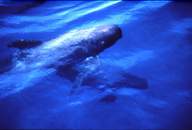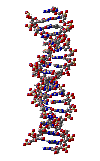|
Fat and smart - the perfect combination? (02/2004)
The reason why human babies are so plump is related to the energetic needs of our uniquely enlarged brain claim a team of scientists in the latest edition of the American Journal of Human Biology1.
Humans are the species with the fattest newborns. Proportionately, our babies are as fat as animals living in the artic and fatter than aquatic animals, which need extra adipose (fat) tissue as insulation for a life in the water. In fact, a human newborn has four times more fat than would be predicted for its size, a fact that always puzzled scientists.
But in evolution things do not happen by chance and so the question is: what were the evolutionary gains that we had, in return for spending extra energy during pregnancy creating fatter babies? What is the function, in newborns, of these extra layers of fat?
Several theories have tried to explain this apparent absurdity, the most common of which, claims that this fat appeared as insulation to compensate for our lacking of the characteristic primate fur. But this does not explain why humans living in radically different temperatures around the globe, show no differences in their amount of adipose tissue. A number of other explanations have been proposed but so far none have managed to be substantiated.
But now, Hamilton Correia, Manuel L. de Areia and colleagues at the Department of Anthropology, University of Coimbra and the Department of Anthropology, University of Aveiro, Portugal claim to have found experimental evidence that can help to answer this enigma.
The team of scientists studied 1069 human newborns and found a link between the size of their head and their fatness at birth. The investigators observed that infants with bigger heads were also the ones that fell into the group of fatter babies.
We do know that the primary function of the mammalian body fat is to serve as energy storage. A clear example is the rapid fat deposition in females at puberty and the subsequent use of this tissue for the energetic needs of pregnancy and lactation. But the levels of fat deposition in infancy can be even greater which seems to indicate that there might exist a specific need for increased energy reserves. Simultaneously, it is known that the human brain spends high amounts of energy to function and grow and the bigger this organ is, the more energy it needs. This is especially true during the first 3 years of life, when the brain goes through its maximum grown. In fact, a newborn’s brain can expend as much as 60% of the total energy produced by the body.
Based on this knowledge and the results of their work, Correia, Areia and colleagues propose that the “exaggerated” fat in human newborns is at least partially explained as being an important energy reserve for the unique high energetic needs of our large brain in this unique period of life.
Because human newborns face exceptional energetic challenges, this is the time when they will find themselves for the first time outside the mother’s secure placenta and its constant supply of food and so must mobilize their own metabolic reserves until lactation is established. Then, when lactation ends infants will have another nutritionally turbulent period.
And because human babies are not capable of providing for themselves soon after being born, contrary to many other animals, a security system appeared according to Correia and colleagues to ensure that the brain/central nervous system development during initial life would not be compromised. The team of scientists proposes that this is the function of the extra fat tissue at birth in human; to safeguard the energetic necessities of our enlarged brain in the nutritionally uncertain time of childhood.
Data supporting their hypothesis have shown that malnutrition in early life can affect the development of the brain and is also one of the major causes for infant mortality. Additionally, recent evolutionary theories described a similar event previously in our history; man’s ancestors seem to have modified their diet drastically, increasing their intake of calories exactly by the time that their brain became bigger.
Finally, because it is known that weight and head size are related to cognitive abilities such as the capacity to learn, reason and remember, all abilities that increase the individual chances of survival and consequently will be favoured by natural selection Correia and colleagues further propose that it was these cognitive abilities that acted as selective pressure for the remarkable fatness humans newborns.
Correia and Areia’s paper is interesting not only because it elucidates an intriguing episode of our life-history strategy, but also because it shows how clever this strategy is, after all, in organisms with limited amounts of energy, as any living being is, the only way to survive is by being able to find the best possible balance between survival and improvement. And we humans are specialists in this without doubt.

1 American Journal of Human Biology (2004); Vol (16), issue 1, pp. 24-30
Original paper’s author
|
In collaboration with the Observatório da Ciência e do Ensino Superior (OCES)
Financed by the Fundação para a Ciência e Tecnologia (FCT) |





